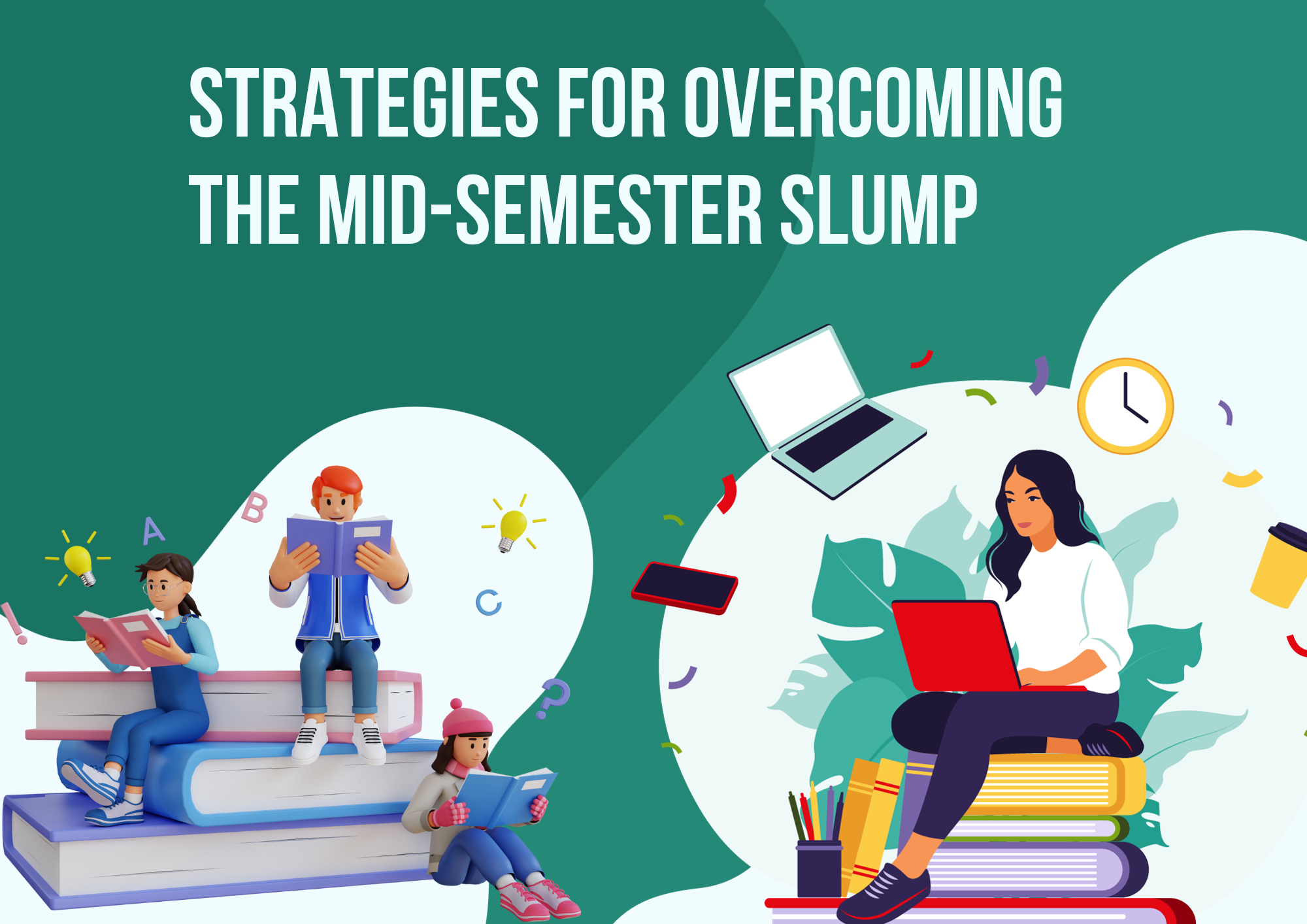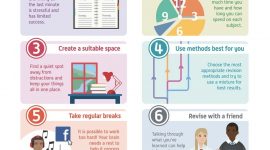The concept of the mid-semester slump
The mid-semester slump is a common phenomenon many students experience during the midpoint of an academic term.
It’s characterized by a decline in motivation, focus, and energy levels, which can negatively impact academic performance. As the initial excitement of the semester wears off, students may face a lack of enthusiasm for their coursework and extracurricular activities.
Highlight the importance of maintaining motivation throughout the semester
Motivation is a crucial factor in academic success. It serves as the driving force behind consistent effort, engagement in learning, and the ability to overcome challenges. Maintaining high levels of motivation throughout the semester is essential for achieving academic goals, staying on track with coursework, and ultimately ensuring a fulfilling and successful college experience.
Preview key strategies for overcoming the mid-semester slump
The practical strategies are designed to help students overcome the mid-semester slump.
These strategies encompass various aspects of academic and personal life, including goal setting, time management, seeking support, adjusting study techniques, maintaining a healthy lifestyle, and addressing psychological barriers.
By implementing these strategies, students can not only navigate the challenges of the mid-semester slump but also build habits that contribute to long-term academic success.
Understanding the Mid-Semester Slump
Define the mid-semester slump and its common characteristics
The mid-semester slump typically occurs around the midpoint of an academic term, manifesting as a dip in motivation and enthusiasm. Students may start to feel fatigued, overwhelmed by coursework, and less engaged in their studies.
Common characteristics include procrastination, a sense of monotony, and a decline in the initial excitement that often accompanies the start of a new semester.
Explore reasons why students often experience a decline in motivation during this period
Several factors contribute to the mid-semester slump. These may include the accumulation of academic stress, the monotony of routine, and the realization that the end of the semester is still a considerable distance away. External factors such as personal challenges, work commitments, or extracurricular activities can also play a role in diminishing motivation.
Discuss the potential impact of the mid-semester slump on academic performance and well-being
The consequences of the mid-semester slump can extend beyond a temporary dip in motivation. Academic performance may suffer as a result of decreased focus and productivity. Additionally, the emotional toll of feeling unmotivated can impact mental well-being.
Recognizing and addressing the mid-semester slump is crucial not only for academic success but also for maintaining a healthy and balanced life during the college years.
Key Strategies for Overcoming the Mid-Semester Slump

Setting Realistic Goals
Break down long-term goals into smaller, manageable tasks
One effective strategy for overcoming the mid-semester slump is to break down long-term academic and personal goals into smaller, more manageable tasks.
By creating a list of specific, achievable objectives, students can maintain a sense of progress and accomplishment throughout the semester. This approach helps prevent the feeling of being overwhelmed by the enormity of semester-long projects or exams.
Prioritize tasks based on deadlines and importance
Prioritization is key to effective goal-setting. Students should assess their tasks based on deadlines and importance.
By focusing on high-priority assignments and deadlines, students can allocate their time and energy more efficiently, reducing the risk of feeling swamped with an excessive workload.
Time Management
Create a realistic and effective study schedule
A well-structured study schedule is a cornerstone of effective time management. Students should create a realistic schedule that accounts for class hours, study sessions, and other commitments. By allocating specific time slots for different tasks, individuals can establish a routine that enhances productivity while allowing for breaks and downtime.
Incorporate breaks to prevent burnout
While it may seem counterintuitive, taking breaks is crucial for maintaining productivity and preventing burnout.
Short breaks between study sessions can refresh the mind, enhance concentration, and improve overall well-being. Incorporating activities such as stretching, walking, or mindfulness exercises during breaks can further improve focus and energy levels.
Identify and eliminate time-wasting activities
Identifying and eliminating time-wasting activities is another important aspect of effective time management.
Students should evaluate their daily routines to identify activities that consume time without contributing to their goals. Limiting or eliminating these distractions can free up valuable time for more meaningful and productive pursuits.
Seeking Support
Connect with classmates for group study sessions
Studying with peers can be a powerful motivator. Group study sessions provide an opportunity to share knowledge, discuss challenging concepts, and gain different perspectives on course materials.
Additionally, the social aspect of studying with classmates can make the learning process more enjoyable and foster a sense of camaraderie.
Utilize resources such as tutoring services and academic support programs
Many educational institutions offer tutoring services and academic support programs. These resources can provide valuable assistance for students struggling with specific subjects or concepts.
Seeking help when needed is a proactive step towards overcoming academic challenges and maintaining motivation.
Discuss challenges with professors or academic advisors
Open communication with professors or academic advisors is essential for addressing challenges during the mid-semester slump.
Professors can provide guidance, clarify course materials, and offer advice on overcoming academic hurdles. Academic advisors can assist in creating a plan for academic success and support personal and professional development.
Revisiting and Adjusting Study Techniques
Evaluate the effectiveness of current study methods
As the semester progresses, it’s important for students to evaluate the effectiveness of their current study methods. If certain techniques are not yielding the desired results, it may be time to explore alternative approaches.
This self-assessment allows students to adapt their study strategies to better suit their learning style and the requirements of their courses.
Experiment with new study techniques to enhance comprehension and retention
Trying out new study techniques can be a valuable experiment. Techniques such as active learning, mnemonic devices, and visualization exercises can enhance comprehension and retention of information.
By incorporating various methods into their study routine, students can keep the learning process engaging and effective.
Maintaining a Healthy Lifestyle
Emphasize the importance of regular exercise
Physical activity plays a significant role in maintaining overall well-being and combating the physical and mental fatigue accompanying the mid-semester slump. Incorporating regular exercise into a daily routine can boost energy levels, improve mood, and contribute to better focus and concentration.
Prioritize sufficient sleep and a balanced diet
Sleep and nutrition are foundational elements of a healthy lifestyle. Lack of sleep can negatively impact cognitive function, mood, and overall health. Students should prioritize getting sufficient rest each night and establish a consistent sleep routine.
Additionally, maintaining a balanced diet that includes a variety of nutrients is essential for sustained energy and mental alertness.
Incorporate stress-reducing activities, such as mindfulness or hobbies
Stress-reducing activities are crucial for maintaining mental well-being during the mid-semester slump. Mindfulness practices, such as meditation or deep breathing exercises, can help manage stress and enhance focus.
Engaging in hobbies or recreational activities outside of academics provides a welcome break and contributes to a more balanced and fulfilling lifestyle.
Celebrating Achievements
Acknowledge and reward small accomplishments
Recognizing and celebrating small achievements is a powerful motivator. Rather than focusing solely on long-term goals, students should acknowledge and reward themselves for completing individual tasks and milestones.
This positive reinforcement contributes to a sense of accomplishment and encourages continued effort.
Foster a positive mindset by recognizing progress
Maintaining a positive mindset is essential for overcoming challenges. Instead of fixating on setbacks or perceived failures, students should focus on the progress they’ve made.
Reflecting on achievements, no matter how small fosters a positive outlook and reinforces the idea that continuous improvement is a journey rather than an endpoint.
Overcoming Psychological Barriers

Addressing Perfectionism
Encourage a growth mindset
Perfectionism can be a significant barrier to sustained motivation. Encouraging a growth mindset involves viewing challenges as opportunities for learning and improvement rather than as indicators of failure.
Embracing a growth mindset fosters resilience, adaptability, and a willingness to take on challenges with a positive attitude.
Emphasize learning from mistakes rather than fearing failure
Fear of failure can be paralyzing and hinder academic progress. Emphasizing the importance of learning from mistakes shifts the focus from avoiding failure to using setbacks as opportunities for growth.
Mistakes are an inherent part of the learning process, and viewing them as valuable lessons contributes to a healthier approach to academic challenges.
Managing Stress and Anxiety
Introduce stress-reducing techniques, such as deep breathing and meditation
Stress-reducing techniques are essential tools for managing the psychological impact of the mid-semester slump.
Deep breathing exercises, meditation, and mindfulness practices can help calm the mind, reduce anxiety, and improve overall mental well-being. Incorporating these techniques into daily routines can contribute to a more balanced and resilient mindset.
Discuss the benefits of seeking professional help if stress becomes overwhelming
For some students, stress and anxiety may become overwhelming, necessitating professional support. It’s important to destigmatize seeking help for mental health challenges.
Academic institutions often provide counseling services, and students should be aware of and utilize these resources if needed. Seeking professional assistance is a proactive step towards addressing mental health concerns and maintaining overall well-being.
Conclusion
Summarize key strategies for overcoming the mid-semester slump
Overcoming the mid-semester slump requires a multifaceted approach that addresses various aspects of academic and personal life.
Strategies such as setting realistic goals, effective time management, seeking support, adjusting study techniques, maintaining a healthy lifestyle, celebrating achievements, and addressing psychological barriers collectively contribute to sustained motivation and academic success.
Reinforce the importance of sustained motivation for academic success
Sustained motivation is not only crucial for overcoming the mid-semester slump but also for long-term academic success. By adopting proactive habits and strategies, students can navigate challenges, stay engaged in their studies, and cultivate a mindset that supports continuous growth and improvement.
Encourage readers to implement the discussed strategies and persevere through challenges
As readers conclude this article, they are encouraged to reflect on the strategies discussed and consider how to incorporate these practices into their lives.
Overcoming the mid-semester slump requires a commitment to personal growth, resilience in the face of challenges, and a proactive approach to academic success.
By implementing these strategies, students can persevere through the mid-semester slump and emerge stronger, more motivated, and better equipped for the remainder of the academic term.









